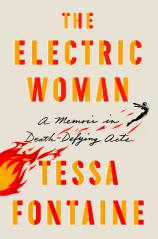Reading Group Guide
Discussion Questions
The Electric Woman: A Memoir in Death-Defying Acts

1. How did THE ELECTRIC WOMAN change your perception of the human body and mind? In their simultaneous journeys, what do Teresa and Tessa show us about the nature of death-defying acts?
2. Tessa describes the anguish she experienced because of her parents’ divorce and the differing truths her parents told her over the years. She also examines the “allergy” she developed to her mother’s love. How does her relationship with her mother compare to your experience with your own parents? How does the love between parents and their children evolve over the course of a lifetime? What events --- large or small --- in the life of your family have significantly altered the way you relate to one another? What experiences have made you rethink the way your family works?
3. The longtime members of the World of Wonders describe how their audiences have changed; politically correct crowds now prefer to watch freak shows in the privacy of their homes. Is it wrong to find “human curiosities” entertaining? What is gained by watching live performances in general?
4. Davy and Teresa’s love story is exceptional. What is at the root of their lasting devotion?
5. As a greenhorn, Tessa has to figure out the pecking order of bosses, showpeople, carnies, ride people and food people. Is this ladder very different from those in other workplaces? How does the World of Wonders dance between business and art?
6. In addition to sword swallowing, fire eating, snake handling and bulb sparking, what skills does Tessa develop while she polishes her acts? What separates those who can hack it from those who can’t? What does Tessa learn about herself and her place in the world?
7. Teresa is a former surf-stunt girl, artist and decorator. How is her creativity carried on by Tessa? How different do they seem? Do they share a common vision?
8. Tessa has to look sexy on the job. She is proud to pass the test of what she calls “coarse teasing,” and she feels protected by her crew after she has a frightening experience with two cops. Other characters also use their sexuality to their advantage --- the bally girl who gets free food, for example. In what ways do Tessa’s or other character’s experiences on the road challenge or reinforce gender stereotypes? How do women at the carnival think about using their bodies for performance? What are the dangers or advantages of being a woman in their environment?
9. What is at the root of the financial insecurity described in this memoir, from the sideshow workers who are recruited from overseas to the fact that Teresa and Davy have to sell their house? What did you discover about the relationships between money, survival and personal fulfillment?
10. What did you predict for Davy and Teresa’s trip to Italy? If you knew you had only a little time left with a loved one, what would you do? Would you stay home or make a final trip? Where would you go? Would you go if you knew you might not make it back?
11. In THE ELECTRIC WOMAN, the cast of characters is diverse, ranging from Spif (knife thrower) and Sunshine (fire eater) to Pipscy (mermaid), Short E (daredevil), Red (multi-talented former Navy SEAL), and talkers Cassie and Tommy. To what extent does the World of Wonders become Tessa’s second family? Who made the biggest impression on you? Which act would you want to perform?
12. In “Cash Money,” Tessa makes up stories to enhance the audience’s excitement. How would you answer her question “Is it okay to lie in service of entertainment?” What do you think about lies versus illusions? Does an audience’s expectation of being tricked or convinced change the way you feel about the performance?
13. Tessa describes long hours and strenuous physical labor. The work is at times grueling and strict, but also brings the freedom of being on the road and working seasonally. How might these characteristics change the way a person feels about work? What were your ideas about carnival workers or sideshow performers before reading the book, and have they changed?
14. From the story of Lucille Horn, saved by a Coney Island incubator, to Teresa’s many hospitalizations, medical advances are a key aspect of this memoir. How much life-saving technology would you want administered to you? Did THE ELECTRIC WOMAN change your opinion about end-of-life care?
15. Even though life in the sideshow, in the hospital, and in Italy is full of surprises, routines are also an essential part of these worlds. In “Mud,” Tessa delivers a full chronology of a typical day in her life. What kinds of armor does it take to convince ourselves we can do things, particularly anything we are uncertain of? Does it differ for something we have to do over and over again? How does her routine (“fix your hair like a showgirl,” “light up your torches and eat fire”) compare to yours?
16. Tessa tells us about her memories of her brief time with her father, and family stories such as her grandfather Ev’s D-day heroism. But, like most everyone in the World of Wonders, Tessa keeps her past a mystery to her fellow performers. How do she and the other showpeople reinvent themselves? Who does she want them to think she is? How does this reinvention affect the way she thinks about her relationship with her mother?
17. Discuss the book’s title. How does it apply to the various characters and journeys in the book? As Tessa overcomes her fears, how does she ultimately find light?
Guide written by Amy Clements
The Electric Woman: A Memoir in Death-Defying Acts
- Publication Date: May 7, 2019
- Genres: Memoir, Nonfiction
- Paperback: 384 pages
- Publisher: Farrar, Straus and Giroux
- ISBN-10: 0374538409
- ISBN-13: 9780374538408







